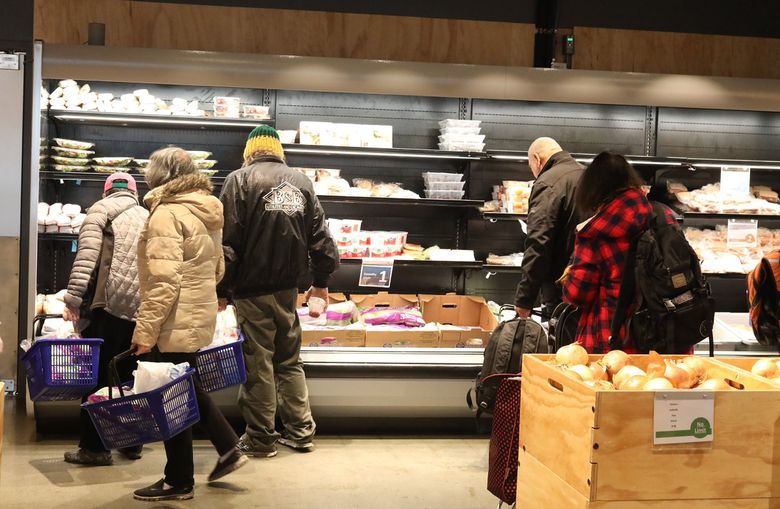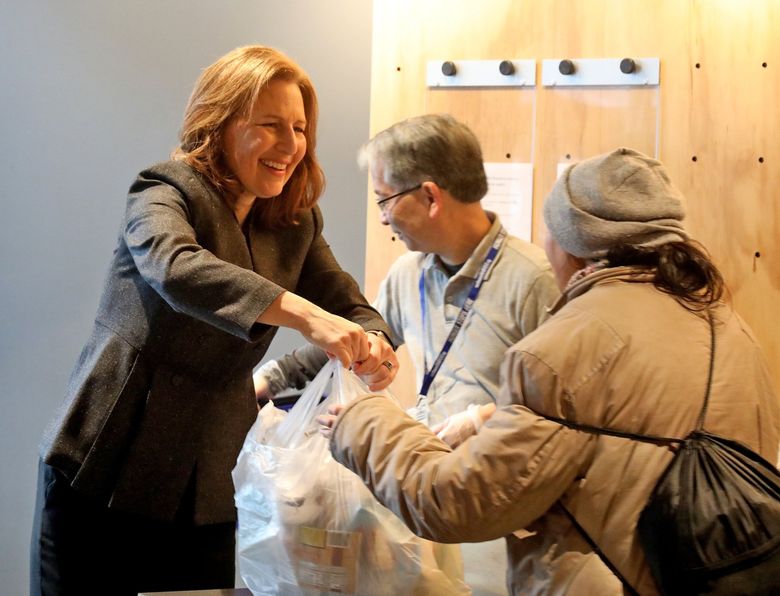‘SNAP benefits are not a luxury’: DelBene, Schrier denounce food-stamp cuts that will affect thousands in Washington
For much of Friday morning, the line snaked out the door, people lined up in a light rain for free groceries. They came for pantry items like rice, pasta and beans; for premade sandwiches and box lunches; and for fresh onions, bananas and gai lan.
A bus would arrive — route 131/132, downtown Seattle to Burien — and the line would swell even more, as people streamed off, towing folding shopping carts and reusable bags.
Each day, Northwest Harvest’s SODO Community Market gives groceries to 750 people from its small food bank south of the stadiums. But private charities alone are not nearly enough to feed the number of people in the area who struggle with hunger, officials said Friday.
U.S. Reps. Suzan DelBene, D-Medina, and Kim Schrier, D-Sammamish, toured the food bank Friday to discuss and denounce a new Trump administration rule that the state says would take food stamps away from nearly 70,000 people in Washington state.
Announced in December, the rule change applies to able-bodied adults without children, who, if they’re not working regularly, receive food stamps (officially known as the Supplemental Nutrition Assistance Program, or SNAP) for only three months every three years. States with high unemployment rates have been able to waive time limits. But the rule change, which is scheduled to go into effect April 1, would set stricter criteria.
The change would cut food benefits for 688,000 people across the country, according to the U.S. Department of Agriculture (USDA). The Washington State Department of Social and Health Services (DSHS) says the change would cut food benefits for 68,000 people in Washington, in 26 counties, including King, Pierce and Snohomish.
“SNAP is the first line of defense in meeting hunger,” Thomas Reynolds, CEO of Northwest Harvest, said. “Charity is not enough.”
DelBene, who noted the average household with SNAP receives about $7 a day in benefits, said the change would drive people “further into poverty.”
“SNAP benefits are not a luxury, they are a need,” Schrier said, calling the cuts “incredibly draconian.”
U.S. Agriculture Secretary Sonny Perdue said the rule will help move people “from welfare to work.”
“States are seeking waivers for wide swaths of their populations and millions of people who could work are continuing to receive SNAP benefits,” he said in December.
There is debate about how many people would lose food benefits, with several states indicating it will be more than the Trump administration has said.
Washington’s estimate, for instance, is nearly 10% of the national estimate, even though the state makes up only about 2% of the U.S. population.
The state says it is confident in its estimate.
“We don’t know and so couldn’t speak to how USDA came up with their relatively low national impact estimate,” Norah West, a DSHS spokeswoman, said.
Janna Kimosh, a USDA spokeswoman, offered no explanation on the administration’s 700,000 figure, and referred questions back to the state.
Fourteen states (including three with Republican governors), Washington, D.C., and New York City have sued the Trump administration to block the change. Their lawsuit estimates that in their states and two cities combined, as many as 850,000 people will lose benefits.
Chris Suh, 32, now works at Northwest Harvest, but said 10 years ago he was struggling with hunger himself, skipping meals, turning the heat off and dreading the first of the month when he’d have to “hustle to come up with rent.”
He said when a friend told him about SNAP, “the weight on my shoulders became a little less.”
He had a job, but it was part time at a restaurant and the owner insisted on paying him in cash, under the table. If this change had been implemented back then, he said, he would have lost his benefits because he wouldn’t have fulfilled the work requirement.
His laptop now sports a sticker that says #SNAPworks, Suh said, “because it did for me and so many others.”
Staff reporter Joseph O’Sullivan contributed to this report from Olympia.




No comments:
Post a Comment